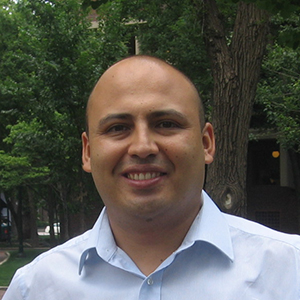Faculty

Ernesto Dal Bó
Political Economics, Influence and Corruption
Omri Even-Tov
Financial Accounting, Corporate Debt
Paul Gertler
Impact Evaluation, Public Economics
Andrea Gorbatai
Knowledge Diffusion, Information Sharing
Jose Guajardo
Operations Analytics, Operations-Marketing Interface
Terrence Hendershott
Financial Market Data, Analytics, and Trading
Przemyslaw Jeziorski
Marketing Analytics, Mobile Marketing
Zsolt Katona
Network Analytics, Social Media and Mobile Marketing
Jonathan Kolstad
Healthcare Analytics, Public Economics
Yaniv Konchitchki
Macro-Accounting, Financial Information
Ming Leung
HR Analytics, Labor Markets
Ross Levine
Financial Regulation, Entrepreneurship
Abhishek Nagaraj
Information Economics, Digital Mapping
Hoai-Luu Q. Nguyen
Consumer Credit Analysis, Banking
Panos Patatoukas
Financial Statement Analysis, Economic forecasting
Sameer B. Srivastava
Organizational Sociology, Computational Linguistics
Toby Stuart
Entrepreneurship, Innovation, Network Analysis
Mathijs de Vaan
Social Network Analysis, Economic Sociology
Johan Walden
Networks in Capital Markets
Reed Walker
Environmental Economics, Public Economics
Grants and Fellowships

The Fisher Center for Business Analytics has a limited amount of funding available for research proposals from Haas faculty members, and invites you to submit a proposal. Priority will be given to junior faculty and to proposals that are willing to share data or otherwise collaborate with other interested Haas faculty members. This year the Center seeks to award $50,000. Through the support of the Ryoichi Sasakawa Foundation, the Center administers Fellowships to PhD students applying analytics in their doctoral research.
Grants
Topic
Research that applies analytics to business – broadly defined as:
- Addressing a business problem
- By using empirical methods to analyze data of non-trivial scale or
- Constructing novel explanatory variables using analytics (e.g. text mining)
- Applying analytics to integrate previously disparate data sets in novel ways.
- Proposal may be limited to data collection for future research – priority given to researchers willing to share data
Funding Availability
Funds will be transferred to individual faculty research accounts by June 2017 to be used before June 30, 2018.
Grants Should Include:
- A 2-3 page description of the research your project
- Recent CV with related papers highlighted
- Project budget (maximum $15,000)
Reporting Requirements
Grant recipients are required to
- Produce a progress report or working paper before June 30, 2018
- Present their work at a seminar upon request
Submission
Email proposals to:
businessanalytics@berkeley.edu
2020 – 2021 Funded Award Recipients


Anastassia Fedyk
Company Name Disambiguation and Industry Mapping
This project will focus on the development of a comprehensive dataset mapping companies to their respective industries.
Read More
Specifically, the objective is to develop company name disambiguation and industry mapping solutions using a large resume dataset covering the universe of firms in the U.S. and a wide range of firms abroad. The employment dataset comes from a collaboration with a private partner. The dataset spans approximately 1 billion individuals globally and is maintained in accordance with major data protection policies. These data offer a comprehensive view of each firm’s company profile, departments, and employees. The result of the project will consist of a corpus of company name variants, mapped to unique company identifiers and corresponding industry classifications including private firms and international firms. This corpus will support a wide variety of business research questions, including entity matching in unstructured data (e.g., news, patents, job postings, and information scraped from online sources such as Glassdoor).

Sameer Srivastava
Cultural carriers – job mobility and cultural change
What role does the mobility of organizational leaders play in shaping corporate culture?
Read More
As firms seek better ways to measure and manage cultural change, researchers and practitioners alike are keen to understand the mechanisms by which such change occurs. While most cultural change efforts focus on internal policies, practices, and procedures, firms also recognize that the infusion of senior leaders from other organizations can often serve as a catalyst for change. Indeed, executives are often brought in from the outside in the hopes that they will serve as cultural carriers who can transmit desirable cultural features from one organization to another. Yet it remains unclear what kinds of leaders—for example, based on career stage or the sequence of prior career moves—have the capacity to be cultural carriers and the contexts—for example, the degree of similarity between the prior and new organization or financial health of the new organization—in which they prove to be most effective.
In this project, we partner with an executive search firm that has compiled a number of datasets on executive profiles, career histories, and organizational culture profiles. Applying methods in computational social science, we integrate data on the career mobility of senior leaders, internal cultural assessments of individuals and firms, external measures of organizational culture based on natural language processing of Glassdoor employee reviews, and Compustat data on firm characteristics and performance. The resulting data set will provide a rich portrait of how individual-level career mobility shapes organizational culture change and, ultimately, firm performance.

Nick Tsivanidis
Migration patterns from cellphone metadata data in Jordan
This project uses metadata from the universe of transactions on one of Jordan’s largest mobile operators to understand the dynamics of migration and the role of social networks in job finding for refugees.
Read More
By merging this with a panel phone survey that collects information about migration, social networks and employment, we employ machine learning methods to predict these outcomes for the whole sample of phone users using only the signatures in the cell data. This allows us to create new insights and analytics into the process of refugee migration, assimilation and job finding patterns in urban environments, typically out of view of traditional administrative datasets.
Fellowships
Doctoral Fellows
Fellowships are part of the education mission.
Through the support of the Ryoichi Sasakawa Foundation, the Center administers Fellowships to PhD students applying analytics in their doctoral research.
Conferences and Seminars

The Center sponsors conferences that invite scholars from around the world to visit Berkeley and share their research by applying analytics to business challenges. The Center also hosts a cross-disciplinary research seminar series for faculty and PhD students. Alternating between Haas faculty and industry data scientists, speakers introduce an algorithm in a particular problem domain and then engage the audience in a discussion of methodology, seeking new applications in different contexts.
Conferences
- Summer Institute in Competitive Strategy (SICS) : June 3 – June 9, 2019
Seminars
TBA
Research Computing

Haas Computing Support
Data Management and Preprocessing
Secure Data Hosting
Cloud Provisioning
Campus Computing Support
Exceed
Savio Cluster
When necessary, navigating campus administration to negotiate Non-Disclosure Agreements, Data Use Agreements, Publication, and Intellectual Property



























